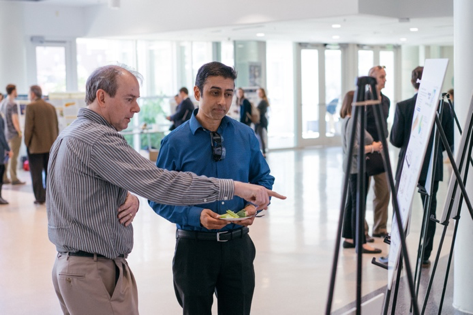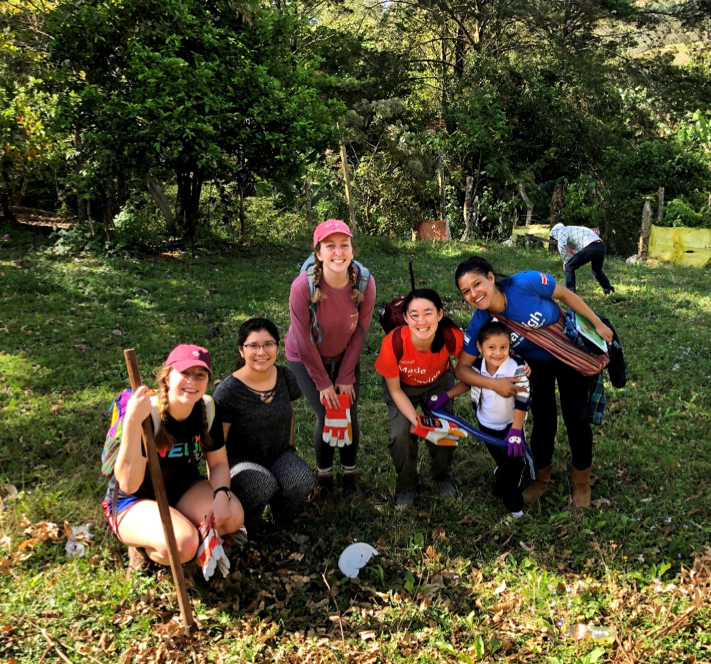Read about the launch of Georgia Tech's Living Building Equity Champions initiative and the Kendeda Building's efforts to connect the campus and greater Atlanta community with equity-centered sustainability programs.
The Georgia Institute of Technology has begun construction on one of the first “Living Buildings” in the Southeast that seeks to transform the local building and construction industry. Living Buildings (similar to other green building programs) achieve certification by accruing credits across a number of criteria. Living Buildings must produce more energy than they use, treat all water on-site, and be regenerative spaces that connect occupants to light, air, food, nature, and community. In a post published on the Alliance for Research on Corporate Sustainability site, I summarize the motivations for organizations to build and certify green and why we might expect Georgia Tech’s demonstration project to begin market transformation in the building and construction industry.
…
It is not difficult for me to find myself represented in most rooms. I can look toward female leaders and see someone who looks like me. Yet, walking into the Women in Green Luncheon, hosted by USGBC, I saw me. I was greeted by a room full of passionate women, many with similar untamed and curly hair, make-up free faces, and vaguely professional, neutral clothing that borders office attire and outdoor comfort.
I had never really grasped the value of representation until that moment when I saw myself in the room. I was immediately humbled by the privilege I have to be so represented in the field I someday hope to enter. To be able to see women who looked like me doing what I hope to do only gave me more drive to realize the possibilities of my own future. One step into the room and the luncheon had already achieved its goal: to inspire the next generation of women in sustainability careers.
Each of the women represented on stage and in the room had come to…
Supporting GT’s already strong tradition of providing students with opportunities to present and discuss their research with their peers, SLS’s Student Showcase gathers students from across all six colleges. Students passionate about building sustainable communities present their research, which engages with the Sustainable Development Goals in their own unique way. The excellence of student research and the diverse set of approaches to sustainability made it very challenging to select winners.
In third place, the student team of Veronica Thompson and Emily Register presented their project, “Designing Artificial Nests to Support Native Pollinators.” Collecting and analyzing big-data on local pollinators’ habitats, Veronica and Emily offered innovative ways of building and designing artificial nests…
This spring, I was generously sponsored by Serve-Learn-Sustain to attend the second annual Aglanta conference. The event was a joint effort by Agritecture Consulting, the Atlanta Mayor’s Office of Resilience, and Southern Company, bringing together stakeholders in government, industry, and non-profits to discuss the future of urban agriculture in smart cities. The conference focused on seven intersections of agriculture with smart cities: resource management, operations, finance, education, distribution, retail, and urban development. There were 33 speakers and 7 panels over the course of the two-day event.
Overall, the conference was enjoyable and informative. I was able to network with urban farmers, EPA staff, tech entrepreneurs, and education reform advocates. I even happened to meet a man who is converting a superfund site to a hydroponic organic farm in my hometown of Brunswick, Georgia. However, there was a moment during one of the panels that…
By: Nataly Granados

This spring break, I had the life-changing opportunity through Alternative Service Beaks (ASB) and SLS to lead a service trip to Nicaragua focused on sustainability. Nicaragua was only my third international trip, along with one to my family’s country and a similar spring break trip last year to the Dominican Republic with ASB. I first want to express my gratitude to SLS and ASB for making this possible, as I never imagined I would have these opportunities. My trip to Nicaragua as a leader was one of the most challenging, educational, and inspiring experiences of my life.
Our work in Nicaragua was with a self-sustained community called La Fundadora and it included projects with their school to beautify it by painting their classrooms, preserve the surrounding environment by preparing dirt to be used for a…
Iceland is a magical place. A land filled with contrasts and extremes. A land filled with volcanos, and at the same time covered in glaciers. A land of people who believe in mythical creatures like trolls, ogres, and elves, and all the while possess an incredibly adept knowledge of the inner workings of their energy supply. A land with only 350,000 inhabitants, and a virtually unlimited supply of energy.

Southern Highlands of Iceland
So what lessons can we learn from this Land of Fire and Ice? How does a country with the potential to be the richest nation in Europe, balance their stewardship to their land and its citizens, and how can we apply these notions to our lives in the United States.
At the end of March, I was fortunate to fulfill a dream of mine, and experience Iceland for myself. I traveled as part of an education abroad experience called the GREEN Program. This program provides…
The Saporta Report, an online news site dedicated to civic and business issues in Atlanta and beyond, recently published a guest column co-authored by SLS-affiliated instructor Emily Weigel, SLS partner Na'Taki Osborne Jelks, and SLS Service Learning and Partnerships Specialist Ruthie Yow. The column focuses on citizen science initiatives with Georgia Tech students and community organizations and residents on Atlanta's Westside.
The Saporta Report, an online news site dedicated to civic and business issues in Atlanta and beyond, recently published a guest column co-authored by SLS-affiliated instructor Emily Weigel, SLS partner Na'Taki Osborne Jelks, and SLS Service Learning and Partnerships Specialist Ruthie Yow. The column focuses on citizen science initiatives with Georgia Tech students and community organizations and residents on Atlanta's Westside.
Catherine Muse is SLS’s new Community Engagement Specialist. In 2013, Catherine graduated from Emory University with a Bachelor of Arts in Sociology. In December 2015, she completed her Masters in Negotiation and Conflict Resolution from Columbia University’s School of Professional Studies.
I was born and raised in Brunswick, Georgia, but moved to Atlanta for college. During my freshman year I decided to participate in the AmeriCorps Jumpstart program as a Corps member providing additional adult support and promoting children’s language and literacy skills with local Atlanta preschoolers. This volunteer experience sparked my initial interest in better understanding how universities connect and engage with local community members as well as what role university faculty, students, and staff can play in shaping the quality of life of local, regional, national, and global communities.
In 2014, I left Atlanta and moved to New York City to pursue my graduate…